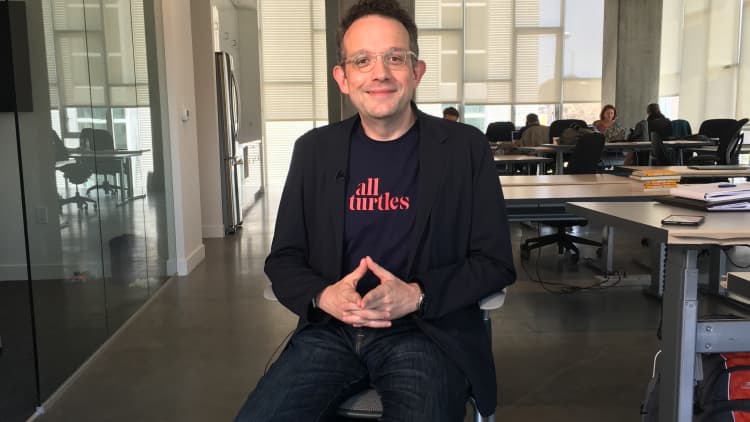
Phil Libin had not eaten in five days when he arrived at the Code technology conference near Los Angeles in late May.
Truffle-infused macaroni and cheese, pork sliders, and ice cream sandwiches were a big draw for many of the attendees, but the investor and former Evernote CEO preferred instead to wander the food stalls to smell the delicacies on offer.
He says he had no interest in actually tasting any of the food.
The lack of hunger has been one of the more unexpected outcomes of his regular multi-day fasts. For up to 8 days at a time, Libin will consume only water, tea and black coffee. He's lost about 80 pounds in seven months, and is hoping to drop an additional five pounds.
Libin is now an outspoken proponent of intermittent fasting, an increasingly popular trend in Silicon Valley. Libin is just one of a growing number of technology executives, who are finding new ways to get healthy, lose weight and gain energy -- some more extreme than others.
"People think it's really wild and crazy," Libin told CNBC in an interview at the San Francisco offices of his company All Turtles. "Turns out it has been really easy."
Libin made a name for himself as the long-time leader of note-taking app Evernote. While running that company, he learned that he was borderline pre-diabetic, meaning he had a high risk of type 2 diabetes.
He tried out a vast array of diets over the years, including Atkins, which emphasizes cutting out carbohydrates, and occasionally lost some weight. But he would always put it back on within a few months.
"I really wanted to find something I could stick with, and really didn't expect it to be fasting," he explained.
The fasting subculture among Silicon Valley execs
He learned about the trend through other tech entrepreneurs in his network.
The most notable example is Kevin Rose, an investor at True Ventures, who got interested in intermittent fasting after learning that Hugh Jackman tried it to get in shape to play Wolverine. He later started an app called Zero to help others track their progress. A wide variety of fasting programs are gaining momentum, including those that involve far shorter spans.
Libin said he's joined a motivational WhatsApp group that includes other Silicon Valley tech executives who are trying out the trend.
Proponents of intermittent fasting point to a body of scientific research that indicates a wide range of health benefits, including improved biomarkers for disease and memory preservation. But critics say that the bulk of this research has been done in animals, and not humans.
Most agree that there's a shortage of research into how intermittent fasting impacts humans, both healthy and chronically ill, and the potential impacts in the short and long-term.
As a result, doctors have mixed feelings about whether to recommend fasting to their patients for health purposes. Most medical experts advise against it for pregnant women, children and people with serious illnesses or low body mass indexes.
"I think starvation is not a sustainable, safe, or physiologically smart approach for weight loss," said Bob Kocher, a physician and investor with Venrock. "It would be easy to hurt your kidneys, bone density, and liver too — which may actually use long term lasting damage."
Others have a more nuanced view. Manuel Lam, a clinical instructor at Stanford Hospital and Clinics, said humans have been fasting for generations, and many religious communities will practice it today. It has only been in modern society that we've become accustomed to such regular meals all-year round. "I practice it myself and I've seen very good results from patients," he said.
For his part, Libin regularly gets health tests to review how his body is responding to the fasts, and has consulted medical experts in the past.
He's so committed to it that he's hoping to continue fasting throughout his life, as he describes the feeling he gets as a kind of euphoria. He also believes that it has vastly improved his clarity and focus, and it has given him a newfound appreciation for food.
Of course, there are the negative side-effects like dehydration-induced headaches (he's now learned to drink a lot more water than usual) and bad breath, as a phenomenon known as "keto breath" is common with prolonged fasting and extremely low carb diets (he's now taken pains to brush his teeth more regularly). Many business meetings also involve eating out, which can create an awkward situation, although Libin said he does tend to indulge if it involves high-quality fare.
The biggest downside? People are so interested in fasting, he ends up talking about it all the time. "It seems like it's all people want to talk to me about," he said.


